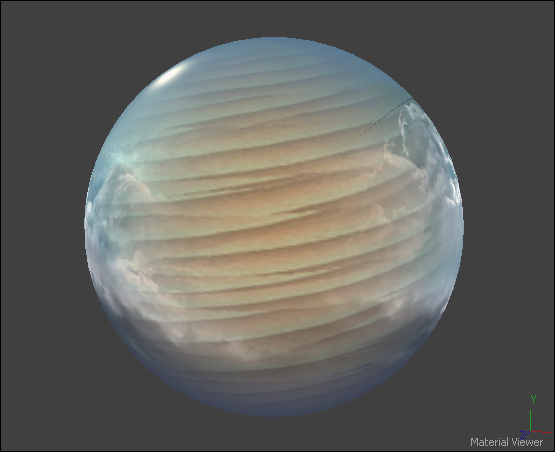Eyeon:Manual/Fusion 6/Falloff
From VFXPedia
[ Main Manual Page ]
The Falloff tool blend two materials together based on the incidence angle between the object the material is applied to and the camera. This is useful when the artist wishes to use one material for portions of the geometry that would reflect light directly back to the camera and a different material for parts that reflect light back into the scene.
The following image shows an example of the falloff material using a wood grain texture for the face material and a sky texture for the glancing material
External Inputs
- Falloff.FaceOnMaterial
- [ orange, optional ] This input expects a 2D image or a 3D material. If a 2D image is provided it will be turned into a diffuse texture map using the basic material shader.
- Falloff.GlancingMaterial
- [ green, optional ] This input expects a 2D image or a 3D material. If a 2D image is provided it will be turned into a diffuse texture map using the basic material shader.
While the inputs for this tool can be images, the output will always be a material.
Controls
Color Variation
The colors for Glancing and Face On are defined by two regular Color Controls
The colors for Glancing and Face On are defined by a Gradient Control. This can be used for a multitude of effects, like creating Toon Shaders for example.
Face On Color
The Face On Color defines the color of surface parts facing the camera. If the Face on texture map is provided then the color value provided here is multiplied by the color values in the texture.
Reducing the material's Opacity will decrease the color and alpha values of the Face On material, making the material transparent.
Glancing Color
The Glancing Color defines the color of surface parts more perpendicular to the camera. If the glancing material port has a valid input, then this input is multiplied by this color.
Reducing the material's Opacity will decrease the color and alpha values of the Glancing material, making the material transparent.
This value controls the transition between glancing and face on strength. It is very similar to an gamma operation applied to a gradient blending one value into another.
This slider sets the numeric identifier assigned to this material. This value will be rendered into the MatID auxiliary channel if the according option is enabled in the renderer.
Tips for Falloff (edit)
| The contents of this page are copyright by eyeon Software. |



